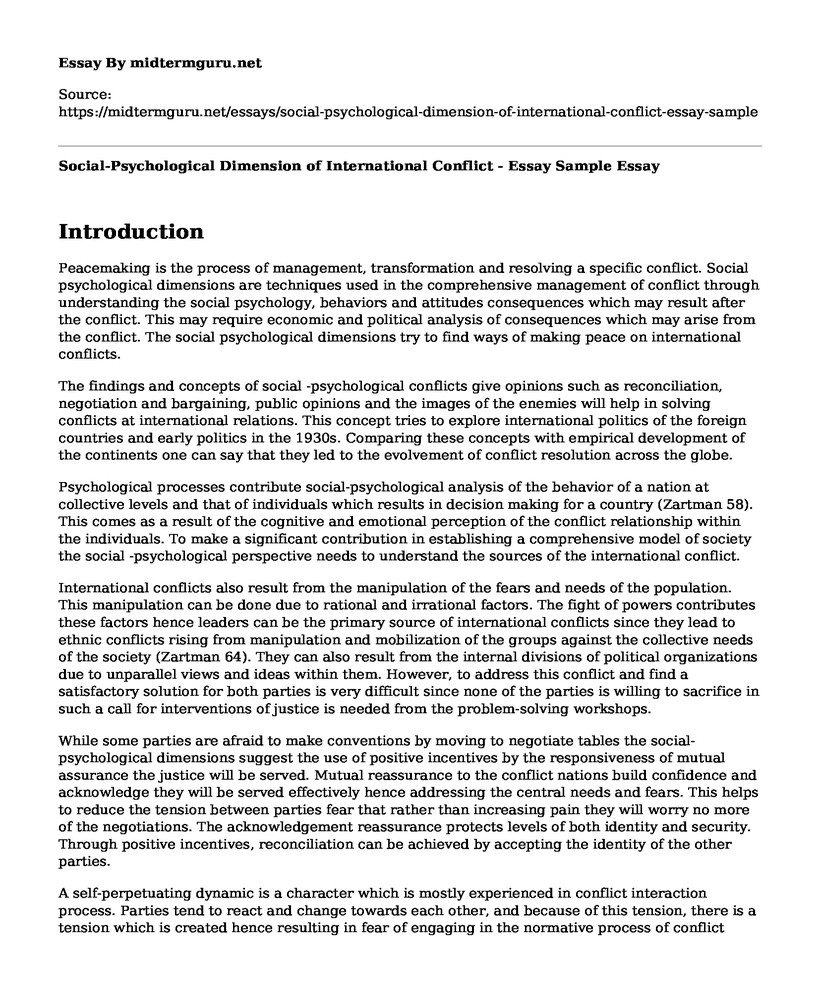Introduction
Peacemaking is the process of management, transformation and resolving a specific conflict. Social psychological dimensions are techniques used in the comprehensive management of conflict through understanding the social psychology, behaviors and attitudes consequences which may result after the conflict. This may require economic and political analysis of consequences which may arise from the conflict. The social psychological dimensions try to find ways of making peace on international conflicts.
The findings and concepts of social -psychological conflicts give opinions such as reconciliation, negotiation and bargaining, public opinions and the images of the enemies will help in solving conflicts at international relations. This concept tries to explore international politics of the foreign countries and early politics in the 1930s. Comparing these concepts with empirical development of the continents one can say that they led to the evolvement of conflict resolution across the globe.
Psychological processes contribute social-psychological analysis of the behavior of a nation at collective levels and that of individuals which results in decision making for a country (Zartman 58). This comes as a result of the cognitive and emotional perception of the conflict relationship within the individuals. To make a significant contribution in establishing a comprehensive model of society the social -psychological perspective needs to understand the sources of the international conflict.
International conflicts also result from the manipulation of the fears and needs of the population. This manipulation can be done due to rational and irrational factors. The fight of powers contributes these factors hence leaders can be the primary source of international conflicts since they lead to ethnic conflicts rising from manipulation and mobilization of the groups against the collective needs of the society (Zartman 64). They can also result from the internal divisions of political organizations due to unparallel views and ideas within them. However, to address this conflict and find a satisfactory solution for both parties is very difficult since none of the parties is willing to sacrifice in such a call for interventions of justice is needed from the problem-solving workshops.
While some parties are afraid to make conventions by moving to negotiate tables the social-psychological dimensions suggest the use of positive incentives by the responsiveness of mutual assurance the justice will be served. Mutual reassurance to the conflict nations build confidence and acknowledge they will be served effectively hence addressing the central needs and fears. This helps to reduce the tension between parties fear that rather than increasing pain they will worry no more of the negotiations. The acknowledgement reassurance protects levels of both identity and security. Through positive incentives, reconciliation can be achieved by accepting the identity of the other parties.
A self-perpetuating dynamic is a character which is mostly experienced in conflict interaction process. Parties tend to react and change towards each other, and because of this tension, there is a tension which is created hence resulting in fear of engaging in the normative process of conflict resolution. In some protracted conflicts which have tension such as Northern Ireland and the Middle East, current conflicts are solved using memories of historical traumas (Zartman 83). However, this requires mirror images where assumptions are not required in assuming the decisions which were taken during history. For the sake of peace between international conflicts group loyalties are needed to mobilize the policies of solving the conflict. This will lead to final interaction and actions which will be taken during decision making to be maintained cohesively.
Conclusion
In conclusion, psycho-social analysis can play an essential role in determining international relations. This is because it combines the cultural, political, economic-c and historical diversity that create forces of conflict. With this, it creates an understanding of these values to the enemies reducing the emotional tension between the enemies hence lead to easy solving of the international conflicts. This analysis focuses on promoting change by maintaining peace between the countries.
Works Cited
Zartman, I. William, ed. Peacemaking in international conflict: Methods & techniques. US Institute of Peace Press, 2007.
Cite this page
Social-Psychological Dimension of International Conflict - Essay Sample. (2022, Dec 21). Retrieved from https://midtermguru.com/essays/social-psychological-dimension-of-international-conflict-essay-sample
If you are the original author of this essay and no longer wish to have it published on the midtermguru.com website, please click below to request its removal:
- Servant Leadership in Nursing Team
- Dispute Characterizations of International Relations
- Leadership Stories: Abdullah, the King of Arabia
- Arabic Love for Nelson Mandela: Honouring the Bravery - Research Paper
- Boko Haram Insurgence: The Devastating Impact of Poor Governance - Essay Sample
- Empowering Nursing Leaders: Unlocking the Power of Emotional Intelligence - Essay Sample
- Finding Love on the Internet - Essay Sample







